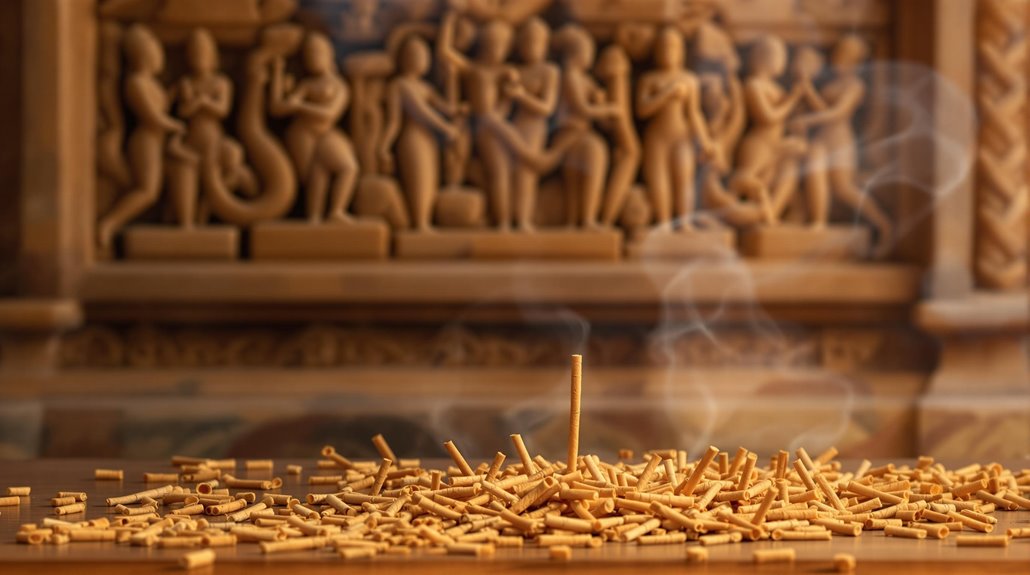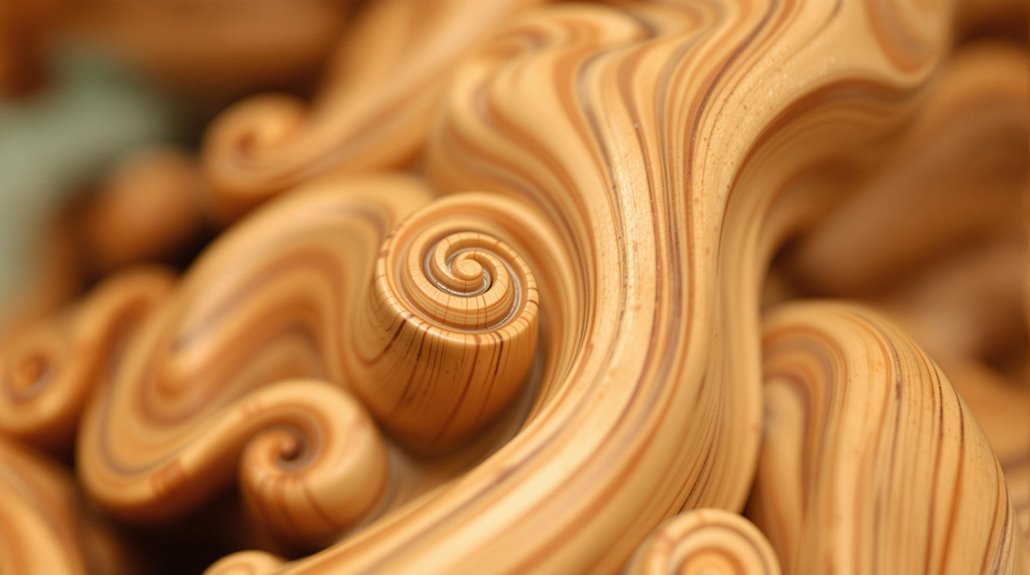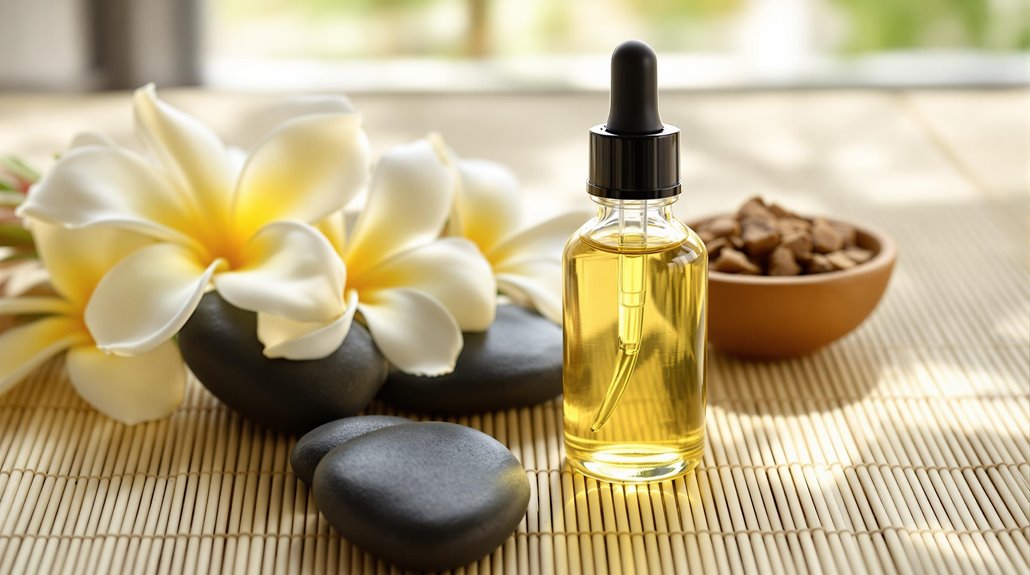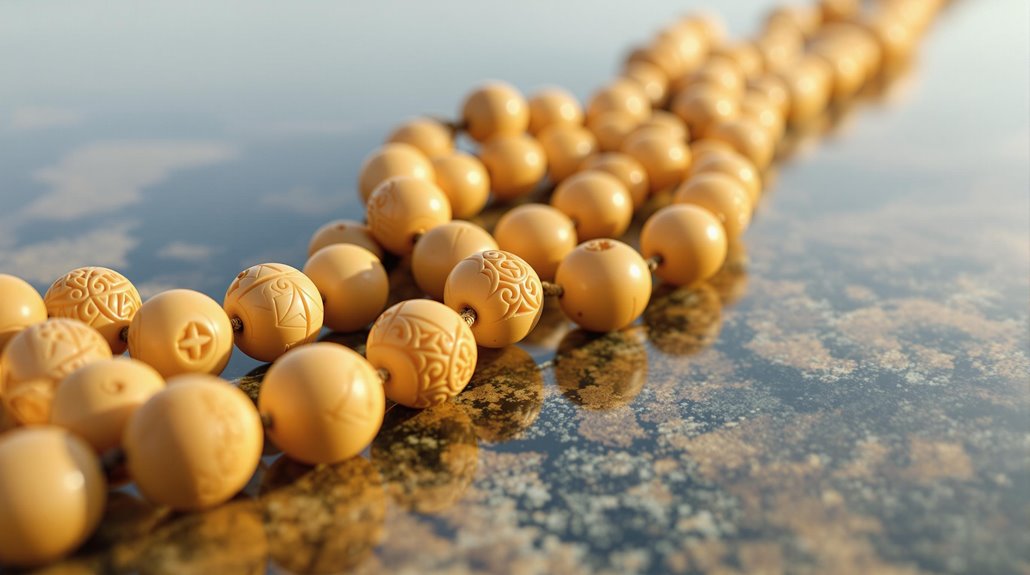Is Sandalwood an Aphrodisiac? Exploring Ancient Beliefs

Sandalwood has long been revered across diverse cultures for its intoxicating aroma and purported aphrodisiac properties. Stemming from ancient traditions in India, China, and beyond, the belief in sandalwood's libido-enhancing abilities can be traced back thousands of years. While ongoing research plunges into the physiological and psychological effects, the specific mechanisms behind its potential impacts on sexuality remain not fully comprehended. Yet the enduring appeal of sandalwood's mystique continues to fascinate. Intrigued to probe deeper into the historical roots and contemporary scientific viewpoints on this sensual scent?
Historical Roots of Sandalwood's Aphrodisiac Reputation
The ancient belief in sandalwood's aphrodisiac properties can be traced back thousands of years. Across ancient cultural traditions, this fragrant wood has been revered for its ability to enhance sexual desire and arousal. In ancient India, sandalwood was a staple in religious ceremonial uses, where it was burned as incense to invoke the divine during intimate rituals. Similarly, in traditional Chinese medicine, sandalwood was believed to have warming, stimulating properties that could invigorate libido and sexual function. The wood's calming properties make it particularly effective when burned as incense during meditation and spiritual practices. This enduring reputation stems from the wood's natural oils, which contain compounds like alpha-santalol and beta-santalol.
These compounds have been shown to have mild sedative and hypnotic effects, potentially contributing to sandalwood's reputation as an aphrodisiac. While the scientific evidence is still limited, the centuries-old association between sandalwood and sexuality cannot be ignored. Its alluring aroma and rich cultural history continue to enthrall those intrigued by the power of natural aphrodisiacs.
Sandalwood's Physiological Effects on Sexuality
While the precise mechanisms behind sandalwood's purported aphrodisiac effects remain a subject of ongoing research, contemporary studies have illuminated its potential physiological impacts on sexual function. Some research suggests that the fragrance of sandalwood may influence hormonal regulation, potentially affecting sexual response. For instance, one study found that exposure to sandalwood odor increased testosterone levels in men, which could enhance sexual desire and performance. Additionally, sandalwood's aromatic compounds have been shown to interact with the olfactory system, which plays a pivotal role in the neural pathways associated with sexual arousal and pleasure.
However, it is imperative to note that the evidence is still limited, and more robust studies are needed to fully understand the complex relationship between sandalwood, hormones, and human sexuality. Nonetheless, the traditional beliefs around sandalwood's aphrodisiac properties have sparked ongoing scientific interest in this intriguing natural compound. The essential oil can be incorporated into Ayurvedic massage oils to enhance intimate connections while promoting relaxation and balance.
Psychological Impacts of Sandalwood's Aroma
Beyond the physiological effects, the aroma of sandalwood has been shown to exert psychological impacts that may contribute to its perceived aphrodisiac properties. Numerous studies have investigated the olfactory perceptions and emotional responses triggered by the warm, woody scent of sandalwood.
The aroma of sandalwood has been linked to feelings of relaxation, calmness, and even sensuality. When inhaled, the scent can stimulate the olfactory system, triggering a cascade of neural and hormonal responses that may enhance mood and arousal. Some research suggests that the scent of sandalwood can increase feelings of attraction and intimacy, potentially amplifying the aphrodisiac effects.
Furthermore, the psychological association between sandalwood and its historical use in spiritual and sexual rituals may also play a role in its perceived aphrodisiac properties. The power of suggestion and cultural beliefs can substantially influence an individual's subjective experience and interpretation of the scent's effects. This sensual experience can be enhanced by creating a dream blend aromatherapy using sandalwood, myrrh, frankincense, and ylang-ylang oils.
Cross-Cultural Beliefs About Sandalwood's Aphrodisiac Properties
Beliefs about sandalwood's aphrodisiac qualities have deep roots in diverse cultures across the globe. In ancient India, sandalwood was revered for its cultural symbolism, and it was often used in religious ceremonies and rituals associated with love and fertility. Traditional Ayurvedic medicine recognized sandalwood's purported ability to enhance sexual desire and performance, leading to its incorporation into various tonics and elixirs.
Similarly, in traditional Chinese medicine, sandalwood was believed to possess "warming" properties that could stimulate circulation and awaken the senses. This belief contributed to its use as an aphrodisiac, particularly in the form of incense and essential oils. Across the Middle East, sandalwood has long been associated with romance, often being used in perfumes and as a component in love potions.
Interendearingly, these cross-cultural beliefs about sandalwood's aphrodisiac properties persist to this day, despite a lack of scientific consensus on the subject. The enduring appeal of sandalwood's mystique continues to fascinate the human imagination. The oil's soothing and calming properties make it particularly effective when used in aromatic massage practices designed to enhance intimacy.
Modern Scientific Research on Sandalwood's Libido-Enhancing Abilities

Despite the long-standing cultural beliefs surrounding sandalwood's aphrodisiac properties, modern scientific research on the topic has yielded mixed results. While some studies have suggested that sandalwood oil may possess natural aphrodisiac properties, the underlying sexual arousal mechanisms are not yet fully understood.
Some research indicates that the aroma of sandalwood may have a stimulating effect on the olfactory system, potentially influencing mood and sexual desire. However, the specific compounds responsible for this effect and their interaction with the human body are still being investigated. Additionally, the efficacy of sandalwood as a libido-enhancing agent appears to be variable, with some studies showing positive results and others failing to demonstrate a significant impact on sexual function or arousal.
Further research is needed to conclusively determine the validity of sandalwood's traditional reputation as an aphrodisiac. Currently, the scientific evidence remains inconclusive, and more rigorous, well-designed studies are necessary to fully understand the potential sexual health benefits, if any, of this ancient botanical. When using sandalwood for any purpose, it is essential to verify that products contain authentic sandalwood oil with a minimum free alcohol level of 90% to ensure optimal results.
Evaluating the Evidence: Fact or Fiction?
While the long-standing cultural beliefs surrounding sandalwood's aphrodisiac properties have captured the public's imagination, a closer examination of the available scientific evidence reveals a more intricate illustration.
When it comes to evaluating the aphrodisiac potential of sandalwood, the scientific consensus remains inconclusive. Some studies have hinted at potential libido-enhancing effects, but these findings are often qualified by factors such as:
- Seasonal variations in the chemical composition of sandalwood oil
- The influence of cultural milieu and individual perceptions
- The need for more robust, controlled studies to validate the claims
The aromatic compounds found in darker heartwood may contribute to sandalwood's perceived sensual effects.
Ultimately, the jury is still out on whether sandalwood can be considered a true aphrodisiac. The allure of this ancient belief endures, but the scientific reality demands a more layered understanding of the complex relationship between this fragrant wood and human sexuality.
Potential Benefits and Limitations of Sandalwood as an Aphrodisiac

Moving beyond the inconclusiveness surrounding sandalwood's aphrodisiac potential, let's examine the possible benefits and limitations of this fragrant wood in the domain of sexual enhancement. Sandalwood's purported ability to improve blood circulation could potentially augment arousal and sensitivity, though the evidence remains inconclusive. Additionally, its calming aroma may help reduce stress levels, which can positively impact sexual function and desire. Like its anti-inflammatory properties, sandalwood's ability to reduce physical discomfort may contribute to increased intimate comfort. However, it's vital to recognize that the efficacy of sandalwood as an aphrodisiac is largely anecdotal, and its effects may vary noticeably among individuals.
While some may experience subtle enhancements, others may not notice any perceptible impact on their sexual experiences. Ultimately, the potential benefits of sandalwood as an aphrodisiac should be approached with cautious optimism, as more rigorous scientific research is needed to fully understand its capabilities and limitations in this sphere.
Incorporating Sandalwood Into a Sensual Lifestyle
Incorporating sandalwood into a sensual lifestyle can be a gratifying way to enhance your intimate experiences. This versatile essential oil can be incorporated into your routine in various ways to create a more romantic and invigorating atmosphere.
- Consider incorporating sandalwood-infused massage oils into your couples' massage rituals. The soothing, woody aroma can help you both relax and connect on a deeper level.
- Engage in mindful couples' meditation sessions, where you and your partner can incorporate the calming scent of sandalwood to promote focus, relaxation, and a heightened sense of awareness.
- Experiment with adding sandalwood to your bath time routine, whether it's through candles, bath salts, or a few drops of the pure essential oil. The warm, grounding scent can create a serene and sensual ambiance.
For optimal results, use sandalwood oil in unscented massage products to prevent competing fragrances from diminishing its natural aphrodisiac properties.




